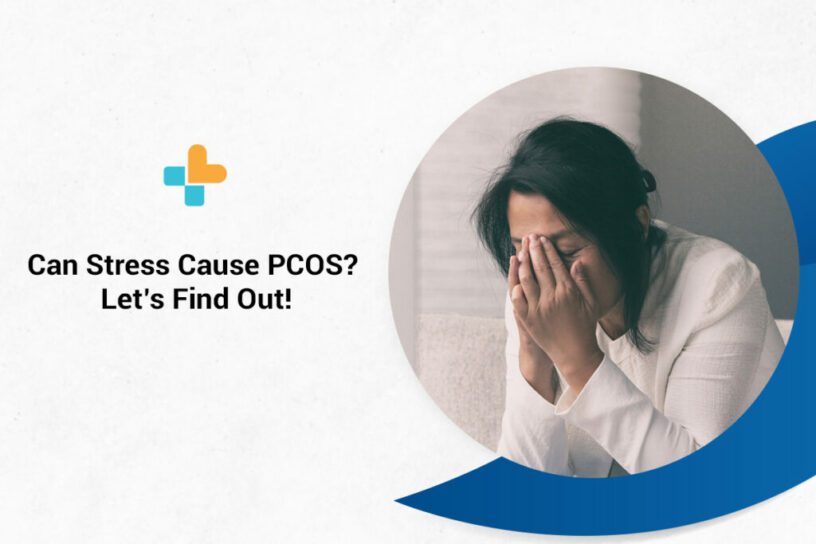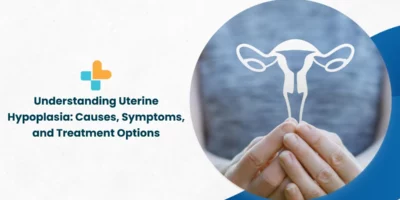Being diagnosed with PCOS (Polycystic ovarian syndrome) can be a challenging journey. And for some women, the diagnosis can cause a vast range of emotions that can have adverse effects on their condition and lifestyle worsening the PCOS. In addition, the emotional strain women encounter while confronting and battling PCOS is real but usually neglected during therapy and not addressed most of the time.
However, there are many ways to cope with stress during PCOS treatment. Keep reading below to learn how stress can cause PCOS and find out effective ways of dealing with PCOS emotionally.
Understanding the Relationship between Stress and PCOS
When you take too much stress or overthink your PCOS, your body releases the stress hormone known as cortisol. In addition, women with PCOS are worried about obesity, irregular period cycle, hormone fluctuations, male pattern balding, and excess facial and body hair.
PCOS (Polycystic ovarian syndrome) usually happens due to excess androgen secretion. Furthermore, cortisol, or stress hormone, is accountable for initiating the secretion of male hormones in the female body and is responsible for the following:
- Raising insulin resistance
- Weakening the immune system
- Irritating secretion of male sex hormones or androgens
- Disturbing the secretion of FSH, LH, and prolactin.
PCOS is a familiar scenario in women’s healthcare, where mental and physical health is impacted. Sometimes their muted fear, expressions, anxiety, rage, and negativity can cause stress. According to research, women on the PCOS spectrum are thrice as likely to get emotionally stressed out than females without PCOS.
This mental stress, if not handled timely, can lead to more severe mental health issues such as anxiety and depression. Furthermore, according to various studies, women who encounter symptoms of PCOS, such as hair loss (alopecia), increased growth of hair (hirsutism), acne, and weight shifts, may feel emotionally stressed, which can impact their mood adversely. These symptoms are diverse and can be perplexing to women, particularly if the cause of the symptoms is unidentified.
How can PCOS induce emotional stress?
A significant amount of this anxiety arises from how an individual feels about their body, also known as a positive or negative body image. Also, as individuals, everyone might have specific ideas of what a typical individual should look. They are based on several aspects such as how you know your own body, how you look at fitness in general, your values, and your body size.
PCOS can impact various body parts and cause bodily transformations, impacting how you feel about your body. Symptoms of PCOS, such as acne and weight gain, can make females conscious of their body image. They may begin feeling less physically attractive and low. Furthermore, the PCOS symptoms may not align with how women perceive womanhood and how females are supposed to be. The frustration of managing these symptoms slowly, over time, can impact what you feel about yourself and fear you emotionally.
PCOS Stress Management: An Overview
Like the diverse physical symptoms of PCOS, various therapy alternatives enhance mental health. In addition, the treatment journey for each woman on the PCOS spectrum, both mentally and physically, is distinct because every female and their PCOS journey is unique.
Likewise, some women might begin feeling better after a few counselling sessions and remain motivated with the therapy they get. Given this positivity, many women make PCOS counselling a routine part of their life. The emotional tension you feel after a diagnosis of PCOS is real and extremely justified, but most significantly, how you manage the symptoms and bear them can make a considerable difference in your PCOS journey.
- A wholesome and dynamic lifestyle enhances your mental and physical well-being for women with PCOS. It comprises a healthy and nutritionally rich diet, more exercise and physical activity, and keeping a healthy weight.
- A nutritionally rich and healthy diet can assist you, in the long run, to aid you in dealing with any emotional tension. It implies following a balanced meal with excellent sources of healthy foods such as vegetables, fruits, complex carbs, healthy fats, and protein.
- Small measures in treating the bodily symptoms, such as performing some fun exercise or even taking a brief walk, may assist you in giving a boost of vitality to your cognitive health.
However, emotional tension, stress, or despair can complicate this therapeutic journey. It is challenging to take care of yourself and maintain a treatment plan or make more beneficial decisions for yourself when your cognitive health is impacted. Therefore, it becomes essential to understand your mood and feelings to handle your PCOS more effectively. If you feel too overpowered by the stress induced by PCOS, it is advised that you seek support for it.
Top ways to keep PCOS stress under control
If you suffer from PCOS (Polycystic ovarian syndrome), you would understand that stress and depression are some of the primary symptoms. It is partly down to the point that females with polycystic ovaries generate far more anxiety hormones, like Cortisol, which can lead to depression, anxiety, fertility difficulties, and high levels of insulin resistance.
In addition, it is essential to try and keep anxiety levels as low as feasible to assist in managing other PCOS signs and maintaining mental and physical health. Furthermore, there are several ways to manage PCOS stress, and some crucial ways to stay relaxed and add a bit of calm to your life are as follows.
1. Get Adequate Exercises
Exercise is an excellent way to conquer stress. Peaceful, healthy fitness routines help manage PCOS. However, trying to manage a high-intensity workout when your body and mind are already worried would not help and might even disturb you more. Instead, try pilates, relaxing yoga, or head outdoors for a long stroll. Also, according to research, being close to nature is an excellent stress buster, so spending some time amidst nature is a great idea.
2. Meditation
Meditation is another excellent way to manage those stress levels when coupled with nutritious meals if you suffer from PCOS (Polycystic ovary syndrome). It can make you feel more comfortable, increase sleep quality, and assist in concentrating thoughts and relaxing the mind.
One of the most significant aspects of meditation is understanding how to breathe accurately; concentrating on deep breathing calms the body and reduces cortisol levels, decreasing insulin resistance. In addition, regular meditation has also been shown to assist in boosting the digestive system, which will aid any weight loss objectives you might have.
3. Maintain a Self-care Routine
One of the most suitable ways to unwind and manage stress or pressure is to take time for a self-care routine. In addition, a good self-care routine doesn’t have to be extended baths filled with scented candles. And self-care can be anything that will assist in boosting the cognitive well-being that makes you feel good.
For instance, allowing yourself the time to concentrate on improving your diet is a wonderful idea – the right nutrition can not only help with PCOS signs and support weight loss, but it can also aid mental health. You could also decide to spend time in nature, take up a new hobby, read a good book, spend time with your loved ones or even binge-watch a TV show.
4. Get Adequate Sleep
Sleep is essential for sound bodily and cognitive health, and one of the most useful things PCOS patients can accomplish to help reduce stress levels is to guarantee they’re getting enough sleep. Insomnia is a typical issue for women with PCOS, so if you have a problem sleeping at night, you could try the following ideas:
- Avoid caffeine consumption throughout the evening – try herbal tea instead
- Don’t consume a heavy dinner late in the evening
- Maintain a good bedtime ritual – a warm bath with essential oil followed by a mug of warm milk is an excellent start!
- Keep electronic gadgets out of the sleeping room- try reading a good book before you switch off the light.
5. Make a Support Network
One of the most promising ways to relieve anxiety and stress is to surround yourself with individuals you can speak to who make you feel helped. While it can be challenging to feel friendly during hard times, making plans with family and friends and sticking to them will improve your mental health. Moreover, there are several online and offline help groups where you can find other females with the same mental stress as you.
The Bottom Line
The journey of managing PCOS can be long, and there can be times when your encouragement and perseverance to keep working toward a healthier lifestyle may seem challenging. However, it is essential to remember that support is available, and you shouldn’t wait to speak to an expert when needed.
At Ayu Health, we understand the physical and mental strain that PCOS can have on patients. Thus we provide the best support system that comprises expert doctors, experienced nurses, and a range of support staff that can help you through PCOS.
Our Hospital Locations
Gynaecology Surgery Hospitals in Chandigarh | Gynaecology Surgery Hospitals in Bangalore | Gynaecology Surgery Hospitals in Jaipur | Gynaecology Surgery Hospitals in NCR | Gynaecology Surgery Hospitals in Hyderabad
Our Doctors
Gynaecology Surgery Doctors in Chandigarh | Gynaecology Surgery Doctors in Bangalore | Gynaecology Surgery Doctors in Jaipur | Gynaecology Surgery Doctors in NCR | Gynaecology Surgery Doctors in Hyderabad
About the Author

Dr. Nikitha Murthy B.S.
Dr. Nikitha Murthy B.S. is a renowned Gynaecologist currently practicing at Ayu Health, Bangalore.
He is s a Consultant with IVF Access at its Rajajinagar clinic. She has over 6 years of experience. Dr. Nikitha has a post-graduation (MS) in Gynaecology, DNB from the National Board of India, and a Fellowship in Reproductive Medicine. He also has vast experience in Post-Graduation (MS) in Gynaecology and DNB.




